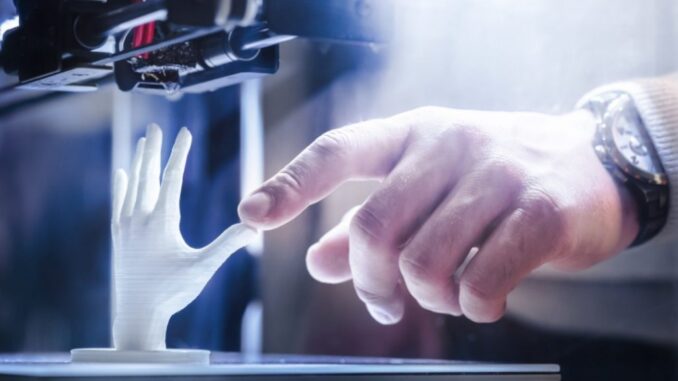
The application of additive manufacturing (AM) for producing on-demand surgical tools is transforming the medical field by providing customized,
precise, and readily available instruments. Here are the key aspects and benefits of using AM for on-demand surgical tools:








Key Aspects of On-Demand Surgical Tools
Customization and Precision
Patient-Specific Instruments: AM enables the creation of surgical tools tailored to the specific anatomy and requirements of individual patients, improving surgical outcomes.
Complex Geometries: AM allows for the production of tools with intricate and precise designs that might be difficult or impossible to achieve with traditional manufacturing methods.
Rapid Production
Fast Turnaround: AM can produce surgical tools quickly, reducing the time between design and actual use. This is particularly beneficial in emergency situations where custom tools are required urgently.
Prototype to Production: Surgeons and medical engineers can rapidly prototype new tool designs, test them, and move to production seamlessly, facilitating innovation in surgical procedures.
Cost Efficiency
Reduced Costs: By eliminating the need for molds and tooling, AM reduces the costs associated with producing small batches or one-off custom tools.
Resource Optimization: AM uses only the necessary amount of material for each tool, minimizing waste and reducing material costs.
On-Site Manufacturing
Point-of-Care Production: Hospitals and surgical centers can set up on-site AM facilities to produce tools as needed, reducing dependency on external suppliers and ensuring tools are available when required.
Inventory Reduction: On-demand production reduces the need for maintaining large inventories of surgical tools, freeing up storage space and reducing inventory management costs.
Benefits of On-Demand Surgical Tools
Improved Surgical Outcomes
Enhanced Precision: Custom tools designed to fit the specific anatomy of a patient can improve the precision of surgical procedures, leading to better outcomes and faster recovery times.
Reduced Surgical Time: Tailored instruments can make surgeries more efficient, potentially reducing the duration of procedures and associated risks.
Increased Flexibility and Innovation
Rapid Prototyping and Iteration: Surgeons can collaborate with engineers to quickly develop and refine new surgical tools, fostering innovation and the development of advanced surgical techniques.
Adaptability to New Procedures: AM allows for the rapid creation of tools for novel or experimental procedures, enabling surgeons to explore new methods and approaches.
Enhanced Patient Care
Personalized Treatment: Custom surgical tools enable more personalized treatment plans, improving patient satisfaction and outcomes.
Accessibility: On-demand production can make advanced surgical tools more accessible to smaller hospitals and clinics that might not have the budget to stock a wide variety of specialized instruments.
Environmental Sustainability
Reduced Waste: AM’s efficient use of materials minimizes waste compared to traditional manufacturing methods.
Localized Production: Producing tools on-site reduces the carbon footprint associated with transporting tools from centralized manufacturing facilities.
Real-World Applications and Examples
Orthopedic Surgery
Custom Guides and Implants: AM is used to create patient-specific surgical guides and implants for orthopedic surgeries, such as knee replacements and spinal surgeries, enhancing precision and fit.
Dental Surgery
Dental Implants and Surgical Guides: Dentists use AM to produce custom dental implants and surgical guides tailored to the patient’s dental anatomy, improving the accuracy of procedures.
Neurosurgery
Cranial Implants and Tools: AM facilitates the production of custom cranial implants and tools for neurosurgery, ensuring a better fit and reducing the risk of complications.
Cardiovascular Surgery
Custom Stents and Instruments: AM allows for the creation of custom stents and surgical instruments used in cardiovascular procedures, improving the efficacy of interventions.
General Surgery
Customizable Instruments: General surgeons can benefit from custom clamps, retractors, and other instruments designed to fit specific procedural needs, enhancing surgical efficiency and safety.
Future Prospects
Integration with Surgical Planning: Combining AM with advanced imaging techniques (such as MRI and CT scans) can further enhance the customization and effectiveness of surgical tools.
Biocompatible Materials: Advances in biocompatible materials will expand the range of tools and implants that can be produced using AM, improving patient outcomes and broadening the scope of on-demand surgical applications.
Regulatory Approvals: As regulatory bodies become more familiar with AM processes, the approval process for 3D-printed surgical tools is expected to streamline, facilitating wider adoption in clinical settings.
In summary, additive manufacturing offers significant advantages for producing on-demand surgical tools, enhancing precision, customization, and efficiency in surgical procedures. These benefits lead to improved patient outcomes, greater flexibility for medical practitioners, and more sustainable and cost-effective healthcare solutions.

Leave a Reply